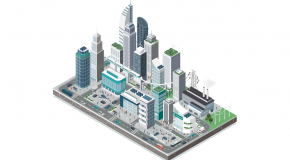WILL (and should) mayors rule the world? This question will surely be hotly debated after the book by Benjamin Barber, a noted political scientist, comes out in October. He argues that, in many ways, mayors already rule the world through informal networks. And more power should be given to them, since they actually get things done.
I am not sure that I agree. Exceptions aside, why should mayors be much better at solving global problems than elected officials at the national level? And will national governments allow them to do so? At any rate, Mr Barber will give us plenty of food for thought when he kicks off The Economist conference “Future Cities: Smart Solutions, Connections and Networks” on October 29th in London, which I have the honor to chair.
Mr Barber is definitely right in arguing that cities are becoming even more important: the United Nations expects the number of city dwellers to reach 6.3 billion by 2050, as many people as there were on the planet ten years ago. That means cities must become more efficient and sustainable--the theme of the conference. This is why, after a discussion of Mr Barber’s thesis, Kit Malthouse, London’s deputy mayor for business and enterprise, Ricky Burdett, professor of urban studies at the London School of Economics, and others will tackle the question “What should our cities be like?”
One answer is certainly: “smarter”, meaning that they are imbued with information technology such as sensors, wireless networks and command centres which allow cities to optimise their operations. There has been much hype about “smart cities” in recent years, but lately some disillusionment has become noticeable: many smart-city projects, if they have gotten off the ground at all, have not lived up to expectations. Even the bottom-up approach to smart cities, which holds that clever cities will be those which provide access to data that lets citizens make their own decisions, is not as successful as generally believed. Except in the area of public transport, few apps using open data have made the jump from interesting novelty to reliable consumer service.
But this is not the only reason the panel on smart cities (or “clever” cities, as The Economist prefers to call them) could be very interesting. It will include Carlo Ratti, director of MIT’s SENSEable City Lab, who is a pioneer when it comes to using piles of data to analyse what is going on in a city. Another well-known panelist will be Richard Sennett, professor of sociology at the London School of Economics, who argues that smart cities might put at risk the serendipity that makes cities such creative places, making them “stupefying” instead.
The last two panels will be about two kinds of urban infrastructure that definitely have to become clever for cities to become smart: transport and the power grid. Both panels will give plenty of examples and advice how urban infrastructure can and will become more intelligent--thanks to what experts such as Mr Burdett already call the “second electrification” to the world’s metropolises.
The views and opinions expressed in this article are those of the authors and do not necessarily reflect the views of The Economist Intelligence Unit Limited (EIU) or any other member of The Economist Group. The Economist Group (including the EIU) cannot accept any responsibility or liability for reliance by any person on this article or any of the information, opinions or conclusions set out in the article.




